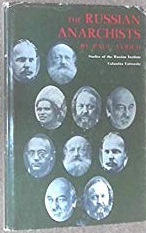 First edition | |
| Author | Paul Avrich |
|---|---|
| Subject | European history, political philosophy |
| Published | 1967 (Princeton University Press) |
| Pages | 303 |
| ISBN | 978-0-691-00766-3 |
The Russian Anarchists is a history book by Paul Avrich about the Russian anarchist movement from the 19th century to the Bolshevik revolution.